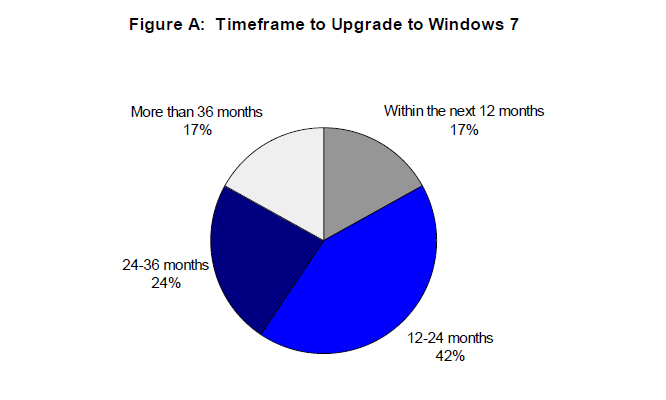84% of IT pros don't plan to upgrade to Windows 7 this year

A new survey has revealed that 84 percent of IT professionals do not have plans to upgrade existing Windows desktop and laptop systems to Windows 7 in the next year, despite early enthusiasm from beta testers of the new operating system.
According to a recent survey by systems management appliance company KACE, many respondents cited the shortcomings of Windows 7's predecessor, Vista, as the leading reason for slow adoption of Windows 7, with software compatibility, cost of implementation and the current economic environment also major concerns.
The vast majority, 83 percent, said they are likely to skip Vista altogether and eventually migrate directly to Windows 7, according to the survey.
The research, which polled more than 1,100 IT workers, showed that IT departments of all sizes have concerns about moving to Windows 7, and 50 percent are considering moving from Windows altogether to alternative operating systems, such as Mac OS and Linux. That's up almost 10 percent from a similar survey conducted last July.
The black eye that is Vista may be to blame.
"The research shows that despite the early enthusiasm for Windows 7, organizations are still wary about adoption, demonstrating what could be described as an even overly cautious approach," said Diane Hagglund, senior research analyst for Dimensional Research and the survey’s author. "Negative public perception of Vista seems to have helped build this layer of distrust with Windows 7."
A quick take on the findings from the survey:
- 84 percent of survey respondents have no plans to upgrade existing Windows desktops and laptops to Windows 7 next year;
- 72 percent indicated they are more concerned about upgrading to Windows 7 than staying with an outdated XP operating system;
- 50 percent revealed they have considered moving from Windows to an alternative operating system, and 27 percent of those cited Mac OS as the top alternative;
- Almost 60 percent of survey respondents do not presently have a tool in place that automates operating system migration;
- Economic factors, such as budget freezes and staff reductions, were cited as other reasons to not immediately adopt Windows 7.
Finally, KACE says 72 percent of survey respondents view a tool to help migrate operating systems as something that helps save time and effort (naturally, the company offers such an approach).
